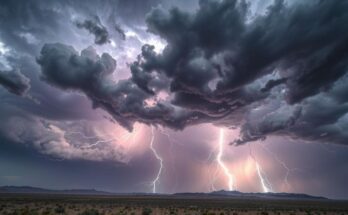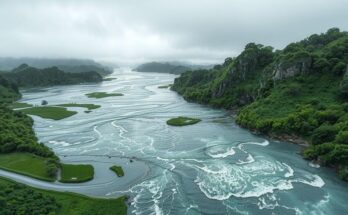Japan is facing its largest forest fire in three decades, with nearly 1,700 firefighters responding to the crisis in Iwate. Authorities have issued evacuation advisories for approximately 4,600 residents, and one death has been reported. Local conditions of record low rainfall have contributed to the wildfire, which has already consumed around 2,100 hectares and damaged multiple structures.
The largest forest blaze in Japan in three decades has prompted authorities to deploy nearly 1,700 firefighters as of Monday. Approximately 4,600 residents in the northern region of Iwate remain under evacuation advisories following the devastating fire, which has resulted in one fatality. This incident occurs after a summer of record heat and unprecedented low rainfall in the area.
The fire, which is situated near the city of Ofunato, has reportedly scorched about 2,100 hectares since it ignited on Thursday. Firefighters from 14 regions, including units from the capital city of Tokyo, are actively combating the flames. Additionally, 16 helicopters, inclusive of military support, are being utilized to assist in extinguishing the fire.
Damage assessments indicate that the wildfire has affected 84 structures as of Sunday, and officials continue to evaluate the situation. Evacuations have displaced around 2,000 individuals who have sought shelter with friends or family, while over 1,200 people have been accommodated in official shelters due to the fire’s proximity.
Morning coverage from national broadcaster NHK showcased alarming footage depicting flames near buildings and significant smoke rising into the atmosphere. Government statistics reveal that while the incidence of wildfires in Japan has generally decreased since the 1970s, approximately 1,300 were reported across the nation in 2023, predominantly between February and April when conditions are typically dry.
Ofunato experienced only 2.5 millimeters of rainfall in February, which is markedly lower than the average February precipitation of 41 millimeters and significantly below the previous record low of 4.4 millimeters set in 1967. These climatic anomalies likely contributed to the conditions that have exacerbated the current wildfire situation.
In conclusion, Japan is grappling with its most severe forest fire in three decades, resulting in fatalities and extensive evacuations in Iwate. The deployment of nearly 1,700 firefighters and the utilization of military resources highlight the urgency of the situation. This event underscores the impact of extreme weather conditions, including record-low rainfall, on the frequency and severity of wildfires in the region.
Original Source: www.voanews.com




